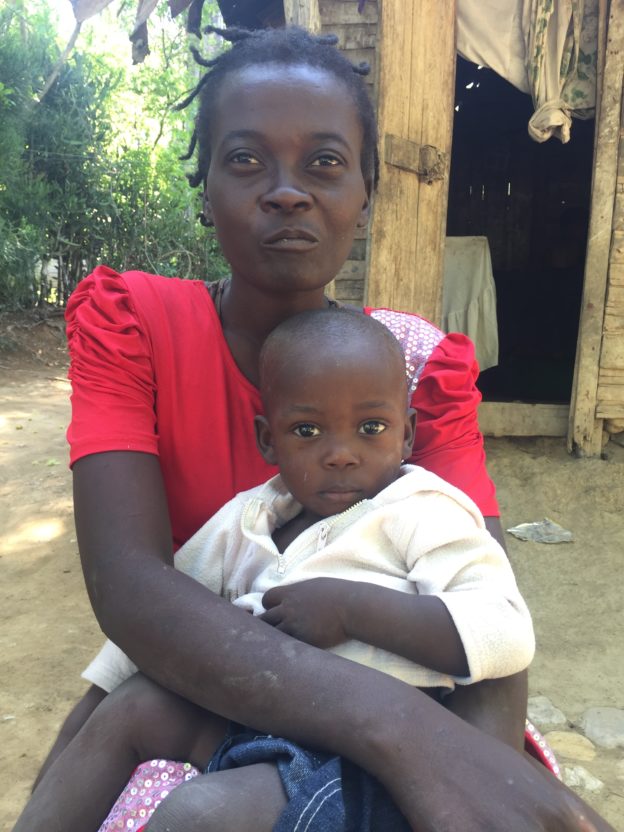Marie Charles lives in Nan Panyòl. Normally, that would mean that she lives in the Dominican Republic. “Panyòl” mean Spanish, and “Nan Panyòl”is one of the ways that Haitians refer to their neighbor. But her home is in a neighborhood of Tomond, on the highway that leads from Pòtoprens, though Central Haiti, to Okap in the north. She is a single mother, living in the front room of a dilapidated house, with a rusted tin roof, that she rents.
Some CLM members seem destined for quick success when you first meet them. They show an energy and an optimism that promises hard, focused effort. Given the tools and the training that the program is able to provide, progress is highly probable for such women. The program’s 96% graduation rate reflects its staff’s hard work, but also that it is well-designed to meet the needs of women who are ready to make use of it. And many are ready.
Marie seems very much like one such woman. She shows a number of good signs. She is optimistic and energetic. She keeps herself and her clothes clean. Her baby, Jackson, is always clean and decently dressed, too. She is minutely attentive to him, carrying him around with her and keeping up a happy banter. She appears to be taking her case manager’s talk about the importance of hygiene and of talking with your baby seriously. She chose goats and a pig as her two enterprises, and explains her choice simply. “I know they’ll have young. That’s why I chose them.” It is, she says, the first time she has ever owned livestock, and she is happy about it.
But beneath her enthusiasm, there are troubling signs. Her case manager, Ricot, describes the way she quickly agrees to any suggestion that he makes, but then does nothing. Much more seriously: She is a single mother not of one boy, but of three with three different men. All three children live with her, but she seems neglectful of her two older sons. She is not sure about their ages, but tends to leave them lying on the bed in her house, without dressing them or even keeping them clean.
The CLM program has neither the tools nor the expertise to evaluate intellectual disabilities. Marie’s two older boys clearly have developmental issues. The older boy is said to be able to walk, but he is entirely silent. The middle boy does not walk at all, but he keeps up a seemingly-meaningless babble. And then there is Marie herself: Her inability to follow through on the things that she agrees to do and the cheerfulness of her disregard for her two older boys might reflect developmental issues as well.
The program regularly works with women who seem to have intellectual disabilities. It would be surprising if the very poorest segment of the population did not include its share of such cases. For some, that might be part of the reason they are so poor. But without specific tools to diagnose or evaluate such issues, case managers and their supervisors generally confront them as they find them, treating them as they treat any of the many unique circumstances that program members face.
Marie is part of the fourth set of fifty families that Ricot has worked with, so he has a lot of experience to draw on. In Marie’s case, he is working increasingly to include her mother in their conversations. Marie herself reports that, though she has longed lived outside her mother’s home, she has always counted on her mother to provide for her and the boys. None of their fathers helps her. Her mother has no other children, so she seems to have been able to provide ongoing support. The older woman makes and sells charcoal and grows vegetables that she sells at the small, roadside market nearby, in Palmis Tanpe.
Ricot’s ability to keep Marie’s mother engaged gives him a sense of hope for Marie. “The mother is always available when I need her.” They have arranged to build a small house for Marie and the boys on family land, and thanks to the mother’s management, Marie’s latrine is already completed. Now that the rainy season has started, Marie is anxious to begin her own vegetable farming, and it is easy to imagine her being able to depend on her mother’s help.
But Ricot may have his work cut out for him to help Marie with the older boys. Malnutrition screening, an important feature of the CLM program, has been delayed by an accident that disabled the program’s nurse. And even if screening, which will happen soon nonetheless, leads to a referral for one or both of the boys, Marie will probably need help staying focused enough to do the necessary follow-up.
(Note: I have replaced the name of this CLM member and her boy with pseudonyms.)
